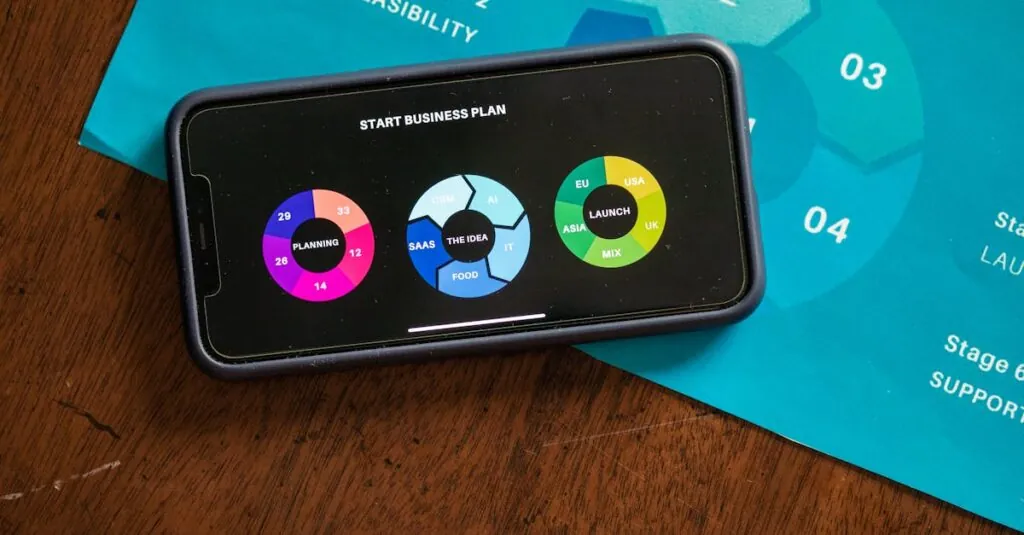Table of Contents
ToggleIn a world where data breaches make headlines faster than a cat video goes viral, ensuring SaaS GDPR compliance isn’t just a good idea—it’s essential. Companies that handle personal data must navigate the tricky waters of the General Data Protection Regulation, or risk facing hefty fines that could make even the most seasoned CFO break into a cold sweat.
But don’t panic! Embracing GDPR compliance can actually be a game-changer for SaaS businesses. It’s not just about avoiding penalties; it’s about building trust with customers and standing out in a crowded marketplace. So grab a cup of coffee and get ready to dive into the world of compliance, where data protection meets opportunity, and yes, you can still have a little fun along the way.
Understanding SaaS GDPR Compliance
SaaS companies manage vast amounts of customer data, making GDPR compliance essential. Non-compliance can lead to fines up to 4% of global revenue or €20 million, whichever is higher. Organizations must ensure data protection principles guide every aspect of their operations.
First, they must obtain explicit consent from users before processing personal data. Ensuring customers can easily withdraw consent promotes transparency. Additionally, SaaS solutions require data minimization. Collecting only necessary information limits risk and aligns with GDPR expectations.
Data security plays a vital role in compliance. Implementing technical measures like encryption safeguards sensitive information. Regular security assessments and audits can identify potential vulnerabilities. Also, appointing a Data Protection Officer (DPO) helps ensure adherence to regulations and provides guidance.
Furthermore, SaaS providers should establish clear data processing agreements. These agreements define the relationship between data controllers and processors. Clearly outlining responsibilities supports compliance and fosters trust with customers. Training employees on GDPR principles enhances an organization’s overall compliance culture.
Should a data breach occur, having an incident response plan is crucial. Companies must notify relevant authorities within 72 hours if personal data is compromised. Notifying affected customers promptly also mitigates reputational damage and strengthens customer relations.
Finally, ongoing compliance evaluation is necessary. Regularly reviewing policies and procedures ensures they remain effective and up to date. Staying informed on GDPR updates allows companies to adapt to regulatory changes efficiently.
Maintaining compliance offers numerous advantages, including building customer trust and enhancing brand reputation. By prioritizing SaaS GDPR compliance, organizations can create a secure environment that fosters long-lasting customer relationships.
Key Principles of GDPR
Understanding the key principles of GDPR is crucial for SaaS companies aiming for compliance. These principles shape the data protection strategies necessary for sustained operations.
Data Protection by Design
Data protection must integrate seamlessly into processing activities from the outset. Organizations should implement necessary measures that safeguard personal data, ensuring it remains secure throughout its lifecycle. This process involves assessing potential risks and applying protective solutions early in project phases. Incorporating privacy-friendly default settings is also essential, as it minimizes exposure to unnecessary data handling. By prioritizing data protection during design stages, SaaS providers enhance compliance and build stronger customer trust.
User Consent Requirements
Obtaining explicit user consent stands as a foundational aspect of GDPR compliance. Users must actively agree to data processing activities, rather than allowing implied consent. Clear information about data usage must accompany consent requests, allowing individuals to make informed decisions. Organizations find success by keeping consent forms concise and straightforward. Renewal of consent at regular intervals ensures ongoing compliance. Furthermore, users retain the right to withdraw consent at any time, reinforcing the importance of maintaining adaptable data management practices.
Challenges for SaaS Providers
SaaS providers face numerous challenges in achieving GDPR compliance. Navigating these complexities is crucial for protecting customer data and maintaining trust.
Data Processing Agreements
Data Processing Agreements (DPAs) are essential for SaaS companies when working with third-party vendors. Each DPA must clearly outline the roles and responsibilities of all parties involved in data processing. These agreements should specify how data is handled, stored, and deleted, ensuring compliance with GDPR requirements. Clarity in these contracts prevents misunderstandings that could lead to non-compliance. Regular reviews and updates of these agreements are necessary to reflect any changes in regulations or business operations.
Cross-Border Data Transfers
Cross-border data transfers present significant GDPR compliance hurdles for SaaS providers. Many companies operate globally and must adhere to restrictions on transferring personal data outside the European Economic Area (EEA). Legal mechanisms like Standard Contractual Clauses (SCCs) or Binding Corporate Rules (BCRs) facilitate these transfers while ensuring data protection standards are upheld. Each transfer requires careful evaluation of the destination country’s data protection laws. Non-compliance in this area can lead to heavy fines and reputational damage.
Best Practices for Achieving Compliance
Achieving GDPR compliance for SaaS companies requires strategic practices. Incorporating regular audits and assessments simplifies this process.
Regular Audits and Assessments
Conducting regular audits ensures compliance with GDPR requirements. These evaluations should target data management practices and security measures. Compliance teams must assess if data protection principles are consistently applied. Utilizing internal or external resources for assessments benefits organizations. Implementing findings from these audits leads to continuous improvement, addressing potential vulnerabilities. Documented results from audits serve as evidence of compliance during regulatory inspections.
Employee Training and Awareness
Employee training plays a crucial role in promoting GDPR compliance. Regular training sessions equip staff with knowledge about data protection principles. Participants should understand the importance of obtaining explicit consent and data handling protocols. Familiarity with security measures, such as encryption, reduces the likelihood of data breaches. Awareness campaigns create a culture of compliance within the organization. Encouraging employees to report potential vulnerabilities enhances data security. Overall, a trained workforce strengthens the organization’s commitment to protecting customer data.
Tools and Resources for SaaS Companies
SaaS companies can effectively manage GDPR compliance using a variety of tools and resources. Compliance management platforms like OneTrust and TrustArc simplify compliance processes by offering frameworks that align with GDPR requirements. These tools help automate documentation, manage consent, and conduct data mapping.
Privacy impact assessment (PIA) tools provide valuable insights into potential risks. Utilizing tools such as Privacera enables organizations to identify vulnerabilities and assess the impact of data processing activities. Regular use of these tools strengthens data protection measures.
Documenting Data Processing Agreements (DPAs) is another critical aspect. Software like DPA Generator assists in creating clear agreements that define roles and responsibilities of data processors and controllers. Keeping these documents updated enhances legal protections.
Training employees on compliance is essential. Platforms like KnowBe4 offer training modules that educate staff on data protection principles and practices. Regular training sessions foster an informed workforce that prioritizes compliance.
Integration of data encryption solutions ensures data security. Products like Symantec or McAfee encrypt sensitive data, making it inaccessible to unauthorized users. Implementing robust encryption safeguards customer information.
Auditing tools such as Compliance.ai help track adherence to GDPR policies. Regular audits allow companies to identify areas for improvement and ensure ongoing compliance with data protection regulations. Evaluating these areas contributes to a culture of accountability.
For cross-border data transfers, legal tools that facilitate compliance are necessary. Using Standard Contractual Clauses or Binding Corporate Rules supports legal data transfers while maintaining protection standards. Adhering to these legal frameworks avoids potential fines.
Finally, staying informed through resources like the official GDPR website and webinars provides updates on regulatory changes. Engaging with professional organizations focused on data protection offers additional guidance and best practices for maintaining compliance. Accessing reliable information enhances overall compliance strategies.
Conclusion
SaaS companies must prioritize GDPR compliance not just to avoid hefty fines but to foster trust and loyalty among customers. By viewing compliance as an opportunity for growth and innovation, organizations can enhance their market position. Implementing best practices like regular audits and employee training is essential for maintaining robust data protection.
As the regulatory landscape evolves, staying informed and adaptable will be key. Utilizing the right tools and resources can streamline compliance efforts and mitigate risks associated with data breaches. By committing to these principles, SaaS providers can create a secure environment for customer data while building a strong reputation in the industry.




